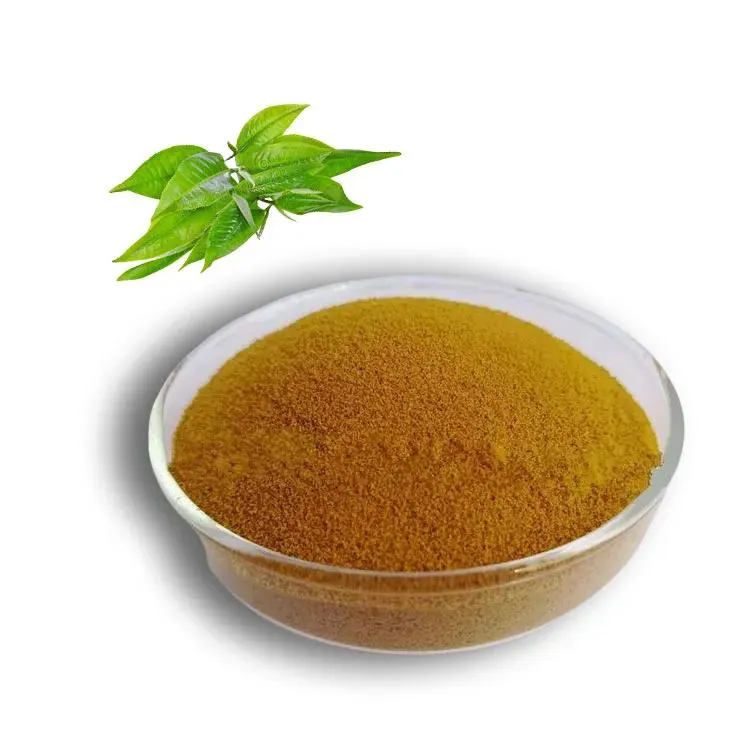- 0086-571-85302990
- sales@greenskybio.com
Green Tea Extract: Nature's Best - Kept Secret.
2024-11-11

Introduction
Green tea has been a staple in many cultures for centuries, but its extract, a concentrated form of the plant's beneficial components, is still a relatively under - explored natural wonder. Green Tea Extract is a powerhouse of health - promoting substances that offer a wide range of potential benefits. It is derived from the leaves of the Camellia sinensis plant, the same plant that gives us the beloved beverage of green tea. This extract has been quietly holding a treasure trove of health secrets, waiting for modern science to fully unlock its potential.

The Richness of Antioxidants
One of the most remarkable aspects of Green Tea Extract is its high content of antioxidants. Antioxidants play a crucial role in maintaining health by protecting the body's cells from damage. In the case of Green Tea Extract, the most important antioxidants are catechins. Among the catechins, epigallocatechin - 3 - gallate (EGCG) stands out as a particularly potent compound.
What are Catechins?
Catechins are a class of flavonoids, which are natural compounds found in plants. They are responsible for many of the health - promoting properties associated with green tea. There are several types of catechins in green tea, including epicatechin (EC), epicatechin - 3 - gallate (ECG), and the aforementioned EGCG. These catechins work together to provide a powerful antioxidant effect.
The Power of EGCG
EGCG is considered the superstar of green tea antioxidants. It has been the subject of numerous scientific studies due to its potential health benefits. EGCG is highly effective at neutralizing free radicals. Free radicals are unstable molecules that can cause oxidative stress in the body. Oxidative stress is linked to a variety of chronic diseases, including heart disease, cancer, and neurodegenerative disorders.
Studies have shown that EGCG can scavenge free radicals before they can cause damage to cells. This antioxidant activity helps to maintain the integrity of cells and their components, such as DNA. By protecting DNA from oxidative damage, EGCG may play a role in reducing the risk of mutations that can lead to cancer. Additionally, it can also help to protect the cells of the cardiovascular system, reducing the risk of heart disease.

Combatting Chronic Diseases
The antioxidant properties of green tea extract, particularly those of EGCG, make it a valuable ally in the fight against chronic diseases.
Heart Disease
Heart disease is one of the leading causes of death worldwide. There are several ways in which green tea extract may help in reducing the risk of heart disease.
- It can help to lower blood pressure. High blood pressure is a major risk factor for heart disease. EGCG has been shown to have a vasodilatory effect, which means it can relax the blood vessels, allowing blood to flow more easily and reducing the pressure on the arterial walls.
- Green tea extract may also help to lower cholesterol levels. It can inhibit the absorption of cholesterol in the intestines and promote the excretion of cholesterol from the body. This helps to reduce the build - up of plaque in the arteries, which is a key factor in the development of heart disease.
- Another way it benefits heart health is by reducing inflammation in the blood vessels. Inflammation is a key contributor to the development of atherosclerosis, the hardening and narrowing of the arteries. The anti - inflammatory properties of green tea extract can help to keep the blood vessels healthy.
Cancer
Cancer is a complex group of diseases that can affect almost any part of the body. While green tea extract is not a cure - all for cancer, it has shown potential in several aspects of cancer prevention and treatment.
- As mentioned earlier, the antioxidant activity of EGCG can protect DNA from damage, which may prevent the initiation of cancer. Some studies have also suggested that EGCG can interfere with the growth and spread of cancer cells. It may inhibit the enzymes that are necessary for cancer cells to invade surrounding tissues and metastasize to other parts of the body.
- Green tea extract may also enhance the effectiveness of certain cancer treatments. For example, in combination with chemotherapy or radiotherapy, it may help to increase the sensitivity of cancer cells to these treatments while reducing the side effects on normal cells.

Weight Management Potential
In the modern world, weight management has become a major concern for many people. Green tea extract has emerged as a potential aid in this area.
Metabolism Boost
One of the ways green tea extract may contribute to weight management is by enhancing metabolism. The catechins in green tea, especially EGCG, can increase thermogenesis. Thermogenesis is the process by which the body generates heat. By increasing thermogenesis, the body burns more calories at rest. This can help to create a calorie deficit, which is essential for weight loss.
Studies have shown that green tea extract can increase the activity of brown adipose tissue (BAT). BAT is a type of fat tissue that is specialized in burning calories to generate heat. When the activity of BAT is increased, more calories are burned, which can lead to a reduction in body weight.
Appetite Suppression
Another aspect of weight management where green tea extract may be beneficial is appetite suppression. Some research suggests that it can help to reduce feelings of hunger and increase satiety. This means that people may consume fewer calories throughout the day, which can also contribute to weight loss.
Skin Health Benefits
The anti - inflammatory and antioxidant properties of green tea extract also extend to skin health.
Anti - Aging Effects
As we age, our skin is exposed to various environmental factors such as UV radiation, pollution, and free radicals. These factors can cause damage to the skin cells, leading to premature aging. Green tea extract can help to combat this process.
- The antioxidants in green tea extract, especially EGCG, can neutralize free radicals on the skin, protecting the skin cells from oxidative damage. This can help to reduce the appearance of wrinkles, fine lines, and age spots.
- Green tea extract can also stimulate the production of collagen. Collagen is a protein that is essential for maintaining the elasticity and firmness of the skin. As we age, the production of collagen decreases, leading to sagging skin. By promoting collagen production, green tea extract can help to keep the skin looking youthful and supple.
Acne and Inflammatory Skin Conditions
The anti - inflammatory properties of green tea extract make it useful for treating acne and other inflammatory skin conditions.
- Acne is often caused by inflammation in the sebaceous glands and hair follicles. Green tea extract can reduce this inflammation, helping to clear up acne breakouts.
- It can also be beneficial for other inflammatory skin conditions such as eczema and psoriasis. By reducing inflammation, it can relieve itching, redness, and discomfort associated with these conditions.
Conclusion
Green tea extract is truly nature's well - kept secret. It is rich in antioxidants, particularly EGCG, which has a wide range of potential health benefits. From combating chronic diseases such as heart disease and cancer to aiding in weight management and promoting skin health, the potential of green tea extract is vast. As more research is conducted, we are likely to uncover even more benefits of this natural wonder. It is important that we continue to explore and understand the properties of green tea extract so that we can fully harness its potential for improving human health.
FAQ:
What are the main antioxidants in green tea extract?
Green tea extract is rich in antioxidants such as catechins, and among them, epigallocatechin - 3 - gallate (EGCG) is a very important one. These antioxidants play a significant role in combating free radicals in the body.
How does green tea extract help in weight management?
Green tea extract has the potential to help in weight management by enhancing the body's metabolism. A faster metabolism can lead to more efficient calorie burning, which may contribute to weight loss or weight maintenance.
Can green tea extract really reduce the risk of heart disease?
Yes, it can. The antioxidants in green tea extract, like catechins, combat free radicals. By doing so, they can help reduce oxidative stress and inflammation in the body, which are associated with the development of heart disease. Thus, green tea extract may reduce the risk of heart disease.
What role does green tea extract play in skin health?
Green tea extract has anti - inflammatory properties. These properties can help soothe the skin, reduce redness and irritation, and may also contribute to overall skin health by protecting the skin cells from damage caused by free radicals.
How can we fully explore the benefits of green tea extract?
To fully explore the benefits of green tea extract, more research needs to be done. This includes in - depth studies on its effects in different populations, at different dosages, and in combination with other substances. Additionally, raising public awareness about its potential benefits can also encourage more people to use it and contribute to a better understanding of its full potential.
Related literature
- The Health Benefits of Green Tea Extract: A Comprehensive Review"
- "Green Tea Extract and Its Role in Preventing Chronic Diseases"
- "Green Tea Extract: Unlocking the Secrets of Skin Health"
- ▶ Hesperidin
- ▶ citrus bioflavonoids
- ▶ plant extract
- ▶ lycopene
- ▶ Diosmin
- ▶ Grape seed extract
- ▶ Sea buckthorn Juice Powder
- ▶ Beetroot powder
- ▶ Hops Extract
- ▶ Artichoke Extract
- ▶ Reishi mushroom extract
- ▶ Astaxanthin
- ▶ Green Tea Extract
- ▶ Curcumin Extract
- ▶ Horse Chestnut Extract
- ▶ Other Problems
- ▶ Boswellia Serrata Extract
- ▶ Resveratrol Extract
- ▶ Marigold Extract
- ▶ Grape Leaf Extract
- ▶ blog3
-
Cranberry Plants and Skin - care Products.
2024-11-11
-
Mulberry leaf Extract
2024-11-11
-
Grape Seed Extract
2024-11-11
-
Curcuma Longa Extract
2024-11-11
-
Purple Sweet Potato Extract
2024-11-11
-
Mulberry Extract
2024-11-11
-
Soy Extract
2024-11-11
-
Resveratrol extract
2024-11-11
-
Berberis aristata Extract
2024-11-11
-
Licorice Root Extract Powder
2024-11-11
-
Dan Shen Root Extract/Salvia Root Extract
2024-11-11





















